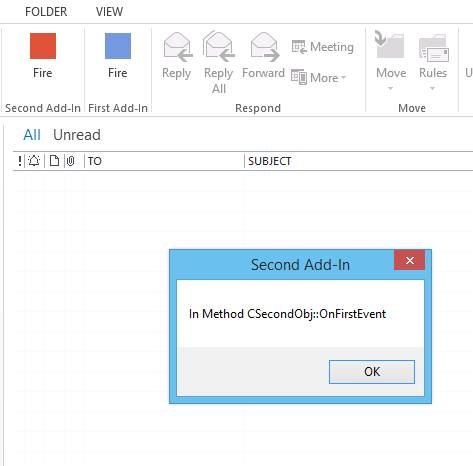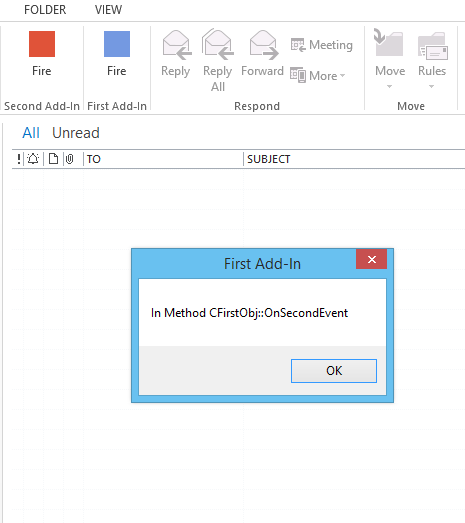
Yep, I should have attached some code. Late night :)! I have attached some example code. It fails because if cannot find the connection point connection. I did try to go old school without ATL, but I get the same result.
There is not any failure code, just cannot find connection.
CComPtr<IUnknown> sp = m_vec.GetAt(nConnectionIndex); /// <<<< ALWAYS RETURNS 0 FAILS HERE
The code ...
//////////
/// DLL #1 (add-in #1)
////////////
// Header
class ATL_NO_VTABLE CSiteDown :
public CComObjectRootEx<CComSingleThreadModel>,
public CComCoClass<CSiteDown, &CLSID_SiteDown>,
public IConnectionPointContainerImpl<CSiteDown>,
public IDispatchImpl<ISiteDown, &IID_ISiteDown, &LIBID_paddinLib, /*wMajor =*/ 1, /*wMinor =*/ 0>,
public CProxy_ISiteDownEvents<CSiteDown>
{
public:
CSiteDown()
{
}
DECLARE_REGISTRY_RESOURCEID(115)
BEGIN_COM_MAP(CSiteDown)
COM_INTERFACE_ENTRY(ISiteDown)
COM_INTERFACE_ENTRY(IDispatch)
COM_INTERFACE_ENTRY(IConnectionPointContainer)
END_COM_MAP()
BEGIN_CONNECTION_POINT_MAP(CSiteDown)
CONNECTION_POINT_ENTRY(__uuidof(_ISiteDownEvents))
END_CONNECTION_POINT_MAP()
DECLARE_PROTECT_FINAL_CONSTRUCT()
HRESULT FinalConstruct()
{
return S_OK;
}
void FinalRelease()
{
}
public:
STDMETHOD(EnableErrorState)(VARIANT_BOOL vbEnable);
};
// CPP #1
STDMETHODIMP CSiteDown::EnableErrorState(VARIANT_BOOL vbEnable)
{
AFX_MANAGE_STATE(AfxGetStaticModuleState());
Fire_EnableEvent(vbEnable);
return S_OK;
}
// Events #1
// Events_CP.h
VOID Fire_EnableEvent(VARIANT_BOOL b)
{
T* pT = static_cast<T*>(this);
int nConnectionIndex;
CComVariant* pvars = new CComVariant[2];
int nConnections = m_vec.GetSize();
for (nConnectionIndex = 0; nConnectionIndex < nConnections; nConnectionIndex++)
{
pT->Lock();
///////////////////////////
/// DOES NOT RECOGNIZE CONNECTION IN THE ADDIN #2
///////////////////////////
CComPtr<IUnknown> sp = m_vec.GetAt(nConnectionIndex); /// <<<< ALWAYS RETURNS 0 FAILS HERE
pT->Unlock();
IDispatch* pDispatch = reinterpret_cast<IDispatch*>(sp.p);
if (pDispatch != NULL)
{
pvars[0].vt = VT_BOOL;
pvars[0].boolVal = b;
DISPPARAMS disp = { pvars, NULL, 1, 0 };
pDispatch->Invoke(88, IID_NULL, LOCALE_USER_DEFAULT, DISPATCH_METHOD, &disp, NULL, NULL, NULL);
}
}
delete[] pvars;
}
//////////
/// DLL #2 (add-in #2)
////////////
// Header
BEGIN_COM_MAP(CDown)
COM_INTERFACE_ENTRY2(IDispatch, IRibbonCallback)
COM_INTERFACE_ENTRY(_FormRegionStartup)
COM_INTERFACE_ENTRY(IDown)
COM_INTERFACE_ENTRY(_IDTExtensibility2)
COM_INTERFACE_ENTRY(IRibbonExtensibility)
COM_INTERFACE_ENTRY(IRibbonCallback)
COM_INTERFACE_ENTRY_IID(__uuidof(paddinLib::_ISiteDownEvents), IExt)
END_COM_MAP()
CComPtr<paddinLib::ISiteDown> m_spDown;
DWORD m_dwDownCookie;
// CPP
STDMETHODIMP CDown::Init()
{
if (m_spDown == nullptr)
{
HRESULT h = CoCreateInstance(
paddinLib::CLSID_SiteDown, NULL, CLSCTX_ALL,
paddinLib::IID_ISiteDown, reinterpret_cast<LPVOID*>(&m_spDown));
if (SUCCEEDED(h) && m_spDown)
{
h = AtlAdvise(m_spDown, GetUnknown(), paddinLib::DIID__ISiteDownEvents, &m_dwDownCookie);
}
}
return S_OK;
}



